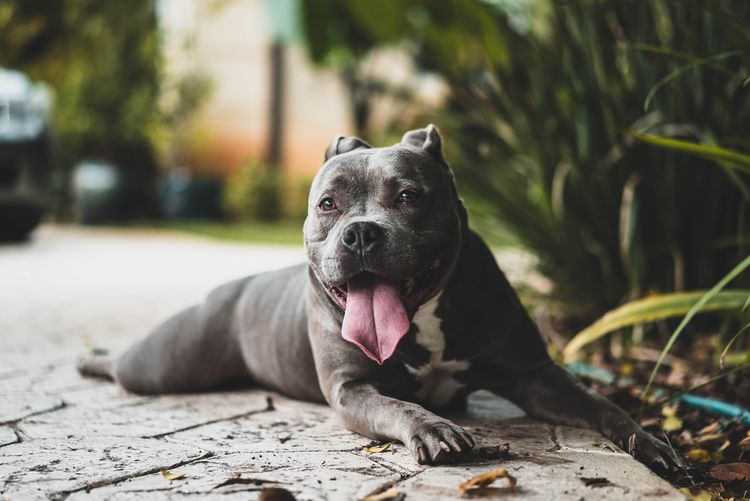1. The endearing "nursery dogs"
In the 19th century, pit bulls were frequently referred to as "nursery dogs" in Britain. They were renowned for their patience and innate protective instincts, and were commonly employed to keep a watchful eye over children.
2 The myth of the "locking jaw"
Pit bulls have strong jaws, but the myth of a "locking jaw" function does not stand up to scrutiny. Their jaws function just like those of all other dogs. However, their biting power is considerable, due to their original breeding for physically demanding tasks.
3. 176 pounds Pit Bull
There are reports of pit bulls weighing up to 176 pounds. A well-known example is the Pit Bull Hulk, who reached an impressive weight of 174 pounds. Although he was originally intended as a guard dog, Hulk spent his life as a beloved family pet due to his gentle nature.. [More]
4. World Pit Bull Day
October 28 is celebrated as World Pit Bull Day. This day is intended to draw attention to the breed and help dispel the myths and prejudices often associated with pit bulls.

5. Loyalty is their hallmark
Pit Bulls are celebrated for their profound connection and exceptional fidelity towards their human companions. Their warm, people-centric nature drives them to continually seek their owners' approval. With appropriate socialization and training, this trait transforms them into delightful family members.
6. Pit Bulls are excellent working dogs
Thanks to their physical strength and mental acuity, pit bulls make excellent working dogs. They are often used in areas such as drug and bomb detection, search and rescue missions, and even as therapy dogs. Their desire to please and their ability to learn quickly make them ideal candidates for these roles.
7. An umbrella term for a variety of breeds
The label "pit bull" in fact encompasses several breeds, which include the American Pit Bull Terrier, the Staffordshire Bull Terrier, and the American Staffordshire Terrier. Despite these breeds sharing analogous physical traits and temperaments, they are genetically distinct from one another.
8. Pit Bulls: Physical maturation meets perpetual youth
Pit bulls attain their physical maturity sooner than their emotional one. They might age up to 2-3 years before they reach full maturity. This often results in an amusing, and at times, draining "adolescent" phase, wherein they are physically robust but maintain a playful, youthful spirit emotionally.
9. Above average lifespan
Pit Bulls boast a notably lengthy lifespan for dogs of their stature. The typical life expectancy of a pit bull ranges between 12-14 years, yet many often surpass this average significantly. Given optimal care and nutrition, they frequently thrive well into their senior years.
10. Social creatures
Pit bulls are highly social animals and get along well with people and other dogs, provided they are properly socialized and trained. They are known for their love of play and their ability to make friends with other dogs.
11. Pit Bulls as talented climbers
Despite their robust stature, pit bulls are amazingly skilled climbers. They can overcome obstacles that seem insurmountable to many other dogs. This can make them a challenge when it comes to keeping yards and other outdoor areas safe.
12. Pit Bulls and aggression
Although pit bulls are often portrayed as aggressive, studies show that they are no more aggressive than other dog breeds. In truth, a dog's behavior depends largely on its upbringing, socialization and treatment. With proper training and care, pit bulls can be very loving and friendly companions.
13. Hollywood's favorite: Pit bulls in the spotlight.
Pit bulls have often starred in movies and television series due to their impressive presence and character. One notable example is Petey, the pit bull from the series "The Little Super Tramps," who became a television icon with his distinctive eye ring markings. [More]
14. Short coat, multitude of colors
Pit bulls are characterized by a short, sleek coat that comes in a myriad of colors and patterns. While their coats require relatively low maintenance, they can shed moderately, and are also susceptible to various skin conditions.
15. Water rats on four paws.
Many pit bulls love to swim. They are strong and capable swimmers and often enjoy playing in the water and cooling off. Many owners use this fondness for the water to provide a fun and healthy form of exercise for their pit bulls.
16. Pit Bulls and cats
Although pit bulls are sometimes considered unfriendly to cats, they can actually get along well with cats if properly socialized and trained. There are many reports of pit bulls developing close friendships with cats, which highlights the breed's ability to form harmonious relationships with other pets
17. Pit Bulls in animal shelters
Unfortunately, pit bulls are disproportionately represented in animal shelters. This is due in part to negative stereotypes and breed restriction laws. But with proper education and adoption, many of these dogs can become loving and loyal family members.
18. Pit Bulls in war: brave heroes on four paws.
Pit bulls have also served in wars. In World War I, a pit bull named Stubby was the mascot of the 102nd Infantry. He participated in 17 battles and was decorated for his courage and intelligence. [More]
19. The high pain tolerance of pit bulls.
Pit bulls have a remarkable tolerance for pain. This can make it difficult to tell when they are injured or ill. Owners must therefore watch for subtle signs of discomfort or changes in behavior.
20. Not recognized by FCI
Although pit bulls are often considered a distinct breed, they are not recognized as such by the FCI (Fédération Cynologique Internationale).
21. Origins in England
The history of pit bulls began in the 19th century in England, Ireland and Scotland. There they were bred as crosses of terriers and bulldogs and have since become one of the most famous dog breeds.
22. A star in the media
Pit bulls are also known as stars in the media. For example, they have been on the cover of "Life Magazine" three times, highlighting their popularity and influence in the culture. [More]











